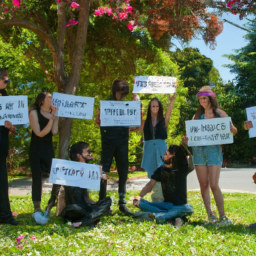In the 1960s, a new generation of young people emerged who rejected mainstream societal norms and values. These individuals, often referred to as hippies, embraced a lifestyle centered around peace, love, and freedom. The term "hippie" is often applied to members of the counterculture due to their unconventional beliefs and practices.
Hippies were known for their rejection of materialism and consumerism, instead choosing to prioritize spiritual fulfillment and communal living. They often advocated for social and political change, promoting ideas of love, equality, and environmentalism. Many hippies were active in anti-war protests and civil rights movements, seeking to challenge the status quo and create a more just and peaceful world.
One of the defining characteristics of hippie culture was their embrace of nonconformity and individuality. Hippies often dressed in colorful, eclectic clothing and adorned themselves with symbols of peace and love, such as flowers and tie-dye patterns. They also embraced alternative forms of art, music, and literature, contributing to the development of the counterculture movement.
